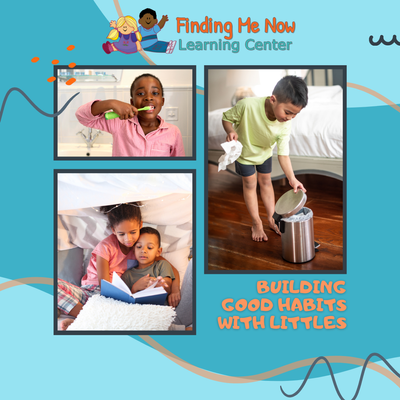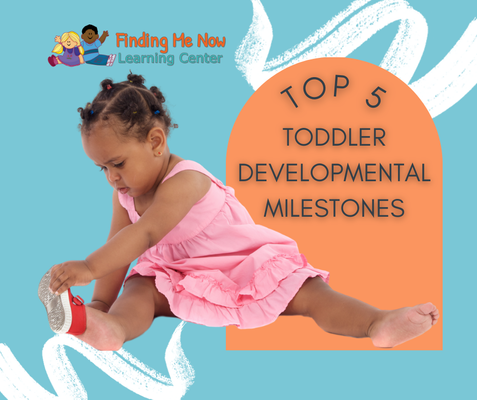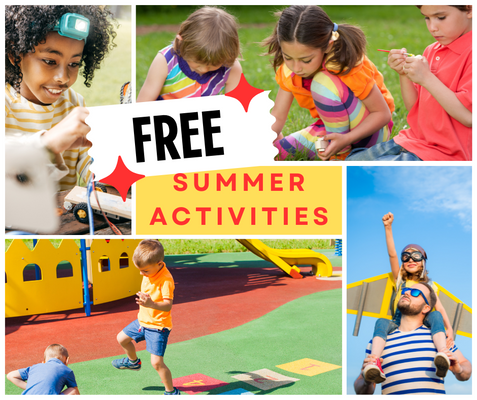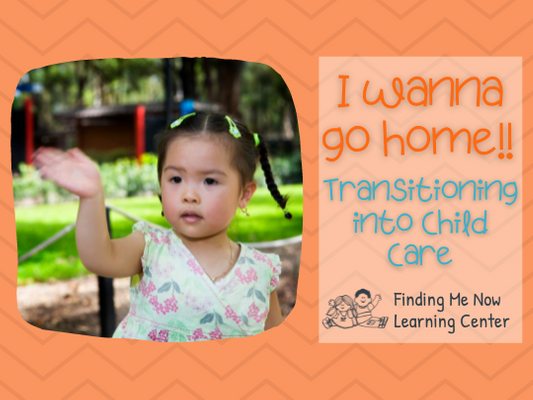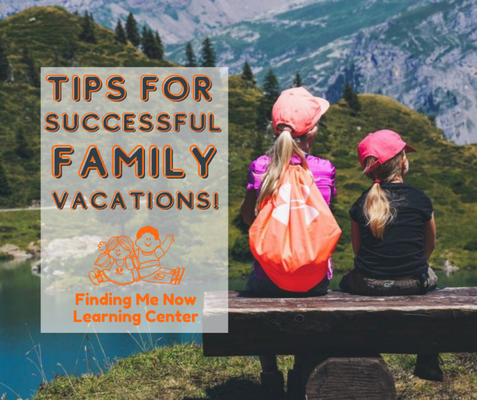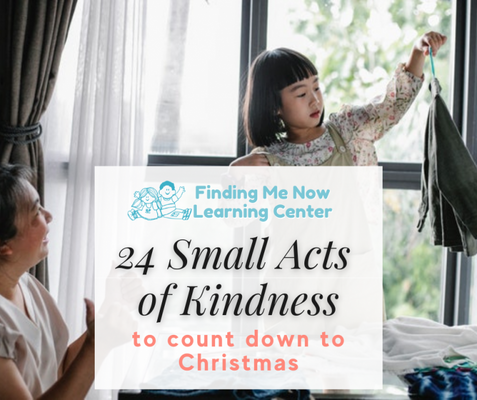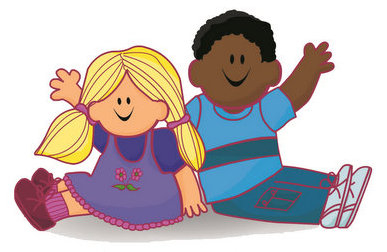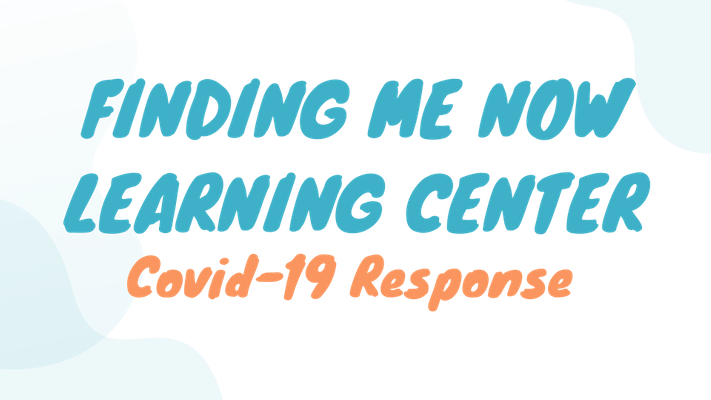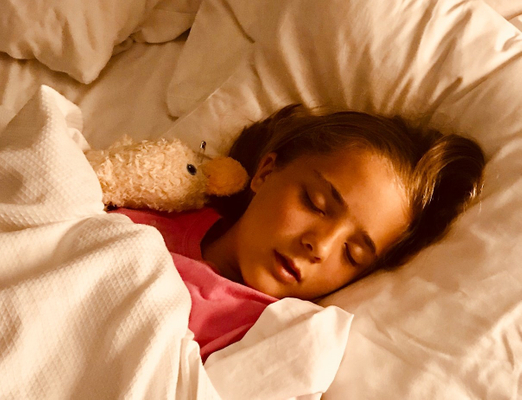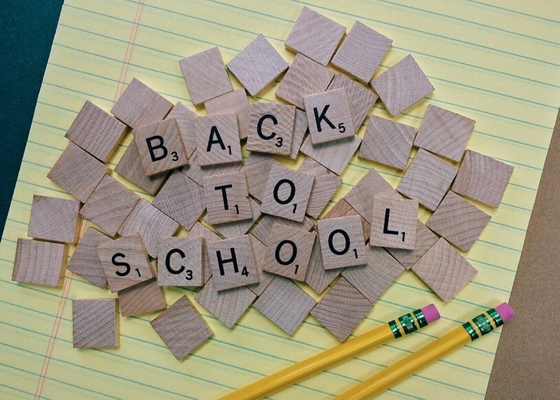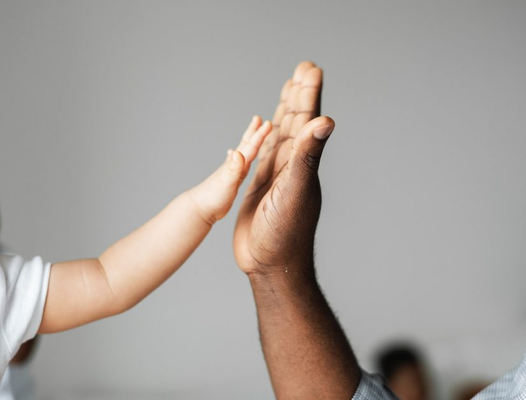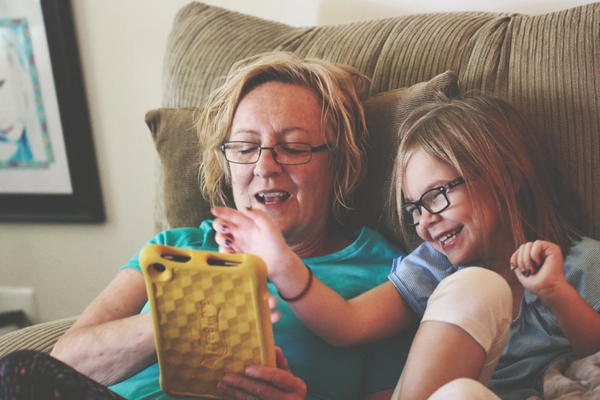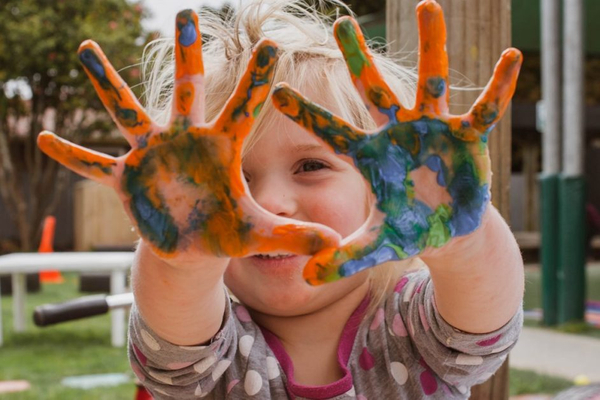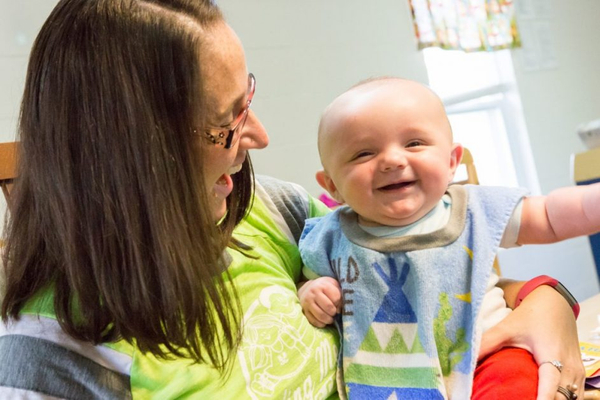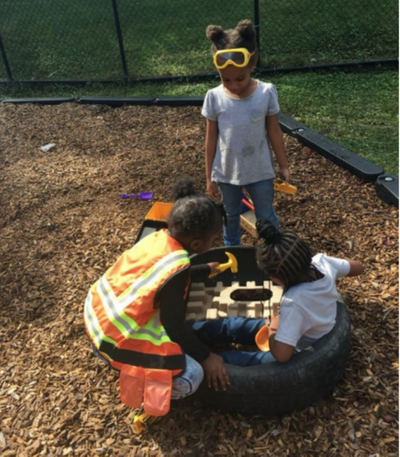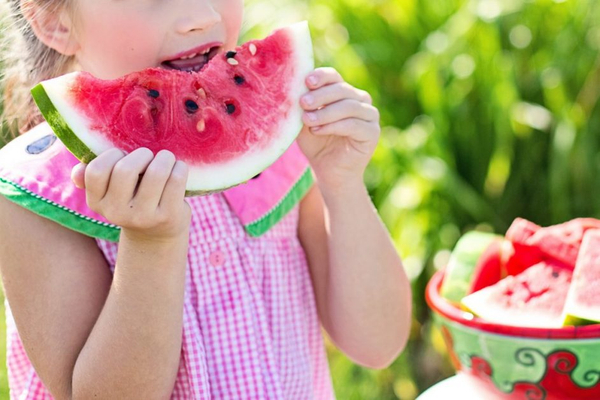Discovering & Affirming Your Child's God-Given Uniqueness
Blog
Building Good Habits With Littles
The new year is a great time to help young children establish consistent habits that support their development and well-being. Here are a few tips that you can use to start building consistent habits at home!
Build a Routine
Decide what you would like to build into your every day schedule, such as brushing teeth, getting dressed, meal times, and bath time.
Create a visual schedule. In our classrooms we have a visual schedule which all of the children can see. It allows children to anticipate and follow along with daily tasks, which also fosters independence.
Encourage Healthy Eating Habits
Toddlers are notorious snackers, so fill their bellies with nutritious and delicious snacks and meals on a regular schedule so they know what to expect.
The more you involve your child in preparing meals, the more independent they will become. Remember that pouring milk or cutting a banana is not work for your child, it's a fun activity that they get to do with their favorite person (you!).
Set a Consistent Bedtime
Establish a bedtime routine that includes calming activities like reading a story or singing a lullaby. Some smart speakers can help you set alarms by starting bedtime music at a certain time or alerting you to toothbrushing or pajama time.
moreTop 5 Developmental Milestones for Toddlers and How Finding Me Now Learning Center Supports Them
Watching your toddler grow and hit those big milestones is one of the most exciting parts of parenting! At Finding Me Now Learning Center in Indiana, we know that every step (or upright wobble) is a cause for celebration. From their first words to those early attempts at independence, toddlers are constantly learning, and we’re here to support them (and you!) every step of the way.
All children develop at their own pace, and these are
Here are the top 5 developmental milestones for toddlers, and how we help your little one thrive at Finding Me Now Learning Center.
1. Watch Out, They’re Mobile!! (Walking)
When it happens: Most toddlers are walking like little pros between 12 and 18 months.
How We Support It: We give toddlers plenty of space to move, groove, and explore! Whether they’re running around our outdoor play areas or practicing balancing skills inside, we’re right there cheering them on. Our team makes sure your child has a safe place to develop their physical coordination—and we’ll celebrate every little victory with them (and you)!
2. Look Who’s Talking Now!
When it happens: Around 18-24 months, your toddler will start chatting more—using short phrases and picking up new words like a sponge.
moreFree Summer Activities to do Together!
As summer unfolds its warm embrace, we're excited to share some fantastic, budget-friendly activities for you and your little ones. Keeping children engaged and entertained during the summer months doesn't have to break the bank. Here are five delightful activities that promise fun, learning, and cherished memories—all without spending a dime!
Nature Scavenger Hunt
Take advantage of the sunny weather and explore the great outdoors with a nature scavenger hunt. Create a list of items such as pinecones, flowers, different types of leaves, or even specific insects like ladybugs or butterflies. Head to your local park, nature reserve, or simply explore your own backyard. This activity not only encourages physical activity but also helps children develop their observation skills and learn about the natural world around them.
DIY Arts and Crafts
Get creative at home with DIY arts and crafts projects using materials you already have. Whether it's making paper plate masks, creating handprint animals, or designing recycled art from household items, there are endless possibilities. Crafting not only stimulates imagination and fine motor skills but also provides an opportunity for bonding and quality time together.
more7 Things You Need to Know About Your Child Care
Jasmine Clark, Operations Coordinator
Choosing a child care program can be confounding, overwhelming, and even frustrating! People in the early childhood education field are uniquely aware of important things that you may not think about when you are making your decision. The following are 7 categories you should ask about while you are looking for care!
Communication
Prompt - Did you get the answers you needed promptly? Did you get a call when promised?
Open door - What is the center’s policy on visits and volunteering?
Finding Me Now has an Open Door guarantee, which means you can peek in the window, visit, or even schedule time to spend in the classroom helping.
Free Day - Does the center have any trial periods?
FMN offers a Free Stay & Play Day which allows your child to come in for a visit or stay for the day.
Financial
Tuition - When is it due?
Fees - Are there any other fees like enrollment or supply fees?
FMN does not charge any fee at any time besides tuition. Supplies and field trips are included in the tuition.
more
I Wanna Go Home!! Transitioning Into Child Care
These are the fateful words as a parent, you dread to hear when dropping your child off to a new environment. Separation anxiety is normal in an infant and toddlers development. Don’t panic Mom and Dad, you are not alone! Around the age of 2 is usually when toddlers start to notice a pattern that you may be out of sight for a while but not forever. Older children may still have some anxiety around drop off time, but there are several strategies to work through to help.
moreTips for Successful Family Vacations
Fun family trips can sometimes be overshadowed by the anxiety of traveling with young children. Many times we as adults stress about the car or plane ride and how it will affect our children and other passengers if our children do not behave in a certain manner. Many people through time have weighed in on this subject with their opinions on both sides of the coin and have compelling arguments. However, what I believe to be correct is what is right for you and your family!
more
The Benefits of Early Childhood Education, and Success Later in Life
Inhibit The Achievement Gap And Promote School Readiness For Your Youngest Learner!
In a longitudinal study spanning over five decades — 1960 through 2016 — with participation from five universities including Harvard, it was observed that kids who participated in early childhood education programs were less likely to be placed in special education classes or held back a grade, as well as have a better chance graduating high-school than other children who did not attend.
At the end of the day, early childhood education oftentimes leads to success later in life!
Finding Me Now Learning Center in Indianapolis, Kokomo, and Fort Wayne is your child’s ally in early childhood education! Through The Creative Curriculum® and with NAEYC accreditation as our guide, our educators lead modern learning programs in loving classrooms.
Why Is Early Childhood Education So Beneficial?
Kids are curious — they are sponges that love to soak up every new experience, new words, and new behaviors that are coming at them at a rapid pace.
more24 Acts of Kindness to Count Down to Christmas
Kindness is learned, and what better way to teach it than to perform acts of kindness within your family and community! Reinforcing acts of kindness with hugs and high fives makes it even more fun! Kids of all ages can get in on the giving. Here is a list of 24 acts of kindness that you and your family can pick some from (or challenge yourself to do all 24!).
- 1. Write a thank you note to your favorite teacher, nurse, doctor, or other public servant
- 2. Choose some canned goods from the pantry to donate to a food bank
- 3. Choose a toy to purchase online for a child in need on Toys for Tots’ Virtual Donation Box
- 4. Give someone a nice compliment
Is My Kid OK? Sneaky Warning Signs of Stress
Kids are generally incredibly resilient. Most kids can weather stress in their lives like pros, and some can learn to adapt to big life changes even better than adults. However, when kids are stressed out, sometimes it’s hard to spot. Without the ability to fully express their feelings, you may see physical, mood, or behavioral changes in children (especially young children) when they need some extra support.
Physical Signs
- Changing Appetite
- Eating more, including comfort eating or complaining of feeling hungry after eating regular meals
- Newly picky eating or insisting they aren’t hungry
- Changes in Sleep Patterns
- Insomnia, having a hard time falling asleep
- Frequent nightmares
- New or renewed bedwetting
- Sleeping too much, falling asleep at odd times, asking to go to bed earlier
- Aches and Pains
- Frequent headaches
- Frequent stomachaches
Mood & Behavioral Signs
- Hyperfocus on Illness
- Keep in mind, it’s very natural for children to “play” new things in their lives like getting their temperature taken, washing hands, wearing masks, and even talking about people getting sick. Children talking, playing, or asking about these things is natural and healthy, but when a child becomes overly focused on them it could be a warning sign of anxiety.
- Focusing too much on sensations in their body
- Seeking reassurance from you that their “symptoms” don’t match up with Covid-19
- Asking to have their temperature taken several times a day as reassurance they are not sick
Prep-Free Boredom Busters!
Today while I was thinking about what to write about for July’s blog, I was browsing through some preschool and early childhood blogs. I realized that so many of the fun and elaborate experiments and projects need some specialized material that you might only be able to get at a craft store or online. But what about a boredom emergency?? Here are a few great ideas for no-prep, fun activities that will bust that boredom!
moreMoving Forward Together
Note: This letter is from 2020 from our chairman Michael Bundy, and we wanted to re-share his sentiments and hopes for all of us on this year's Juneteenth.
Today, Juneteenth, Finding Me Now expresses hope that the events of the last few weeks will become a seminal moment in our country’s history. May this be a time that profoundly improves the lives of black Americans. May this be a time when white Americans can hear the pain coming from the scars of slavery and the ongoing existence of discrimination. May our leaders craft new laws and policies that inspire hope. May God grant reconciliation throughout our nation.
At FMN we reaffirm our goal – Discovering and Affirming Each Child’s God-Given Uniqueness. Black lives do matter. Recently my heart was stirred following a march by the Purdue football players to City Hall in Lafayette. A video was made of the event and one player said something like, “I just hope that my children can grow up without fearing the police.” Amen.
While our company cannot address everything that is so complex in healing our land, we do encourage each of you to be a part of the change that is occurring. A recommended resource is the six-part video series (available on YouTube) from Dr. Tony Evans based upon his book, “Oneness Embraced.” Critical points that he makes are:
moreUnintended Opportunities During Covid-19
Finding Me Now Learning Center is working to keep every child and adult in our building safe.
We also have embraced the “unintended opportunities” to learn and grow that would not be possible without the unusual circumstances we all find ourselves in.
We have concentrated our many efforts in six areas: Concentration on Cleaning, Social Distancing, Health Checks, Family Support, Child Enrichment, and Supporting Our Staff.
moreSelf-Care for Busy Parents
As we ring in 2020, many of us make New Year’s resolutions. Has self-care ever crossed your mind? Many working parents probably think they do not spend enough time with their child (ren) so they should not spend time on themselves because this is selfish. This couldn’t be farther from the truth. Taking a few hours or a day for yourself can be one of the best things you can do for your kids and family.
Benefits of Self-Care
- Avoid burnout
- Lower stress levels
- Re-energizes you so you can enjoy the “little” things your family does
- You become calmer
- Teaches your children to value health and well-being
- Become more self-aware
10 Ideas for Self-Care
- Take a Me Day—do something you enjoy such as going to the spa, shopping ,meeting a friend for lunch, going to a movie alone, nail salon, etc.
- Exercise
- Focus on getting adequate sleep
- Begin a new hobby
- Start a gratitude journal
- Say NO to things that don’t serve you and say YES to things that are fulfilling and replenishing
- Take time with your partner
- Meditate
- Spend time in nature—walk in the park, hike on a trail, gardening, etc.
Surviving Post-Christmas Blues
All the gifts are unwrapped and open. Boxes, bows and wrapping paper are everywhere around the room. The kids are happy and enjoying all their Christmas gifts. Or maybe not…
Maybe your teenage son is upset because he didn’t get the “Yeezy” shoes he wanted. Maybe 15 minutes later, your daughter is complaining that she has nothing to do. Or maybe your kids fighting already because someone else got some better and it’s just “not fair”?
And no one even said, “thank you.”
All of holiday cheer is over and the post-Christmas gift letdown is in full swing! Pull up the “letdown” and make a plan to survive post-Christmas gifts! There is still time to prepare your kids for what happens after your children open their gifts!
moreEven more bedtime tips!
Bedtime Routines
How many of you struggle with bedtime in your household? I know for my family; bedtime use to be horrible. Bedtime was a disaster at my house until I finally set some bedtime routines. My boys never had a “bedtime” and it followed them through to high school. They were tired and grouchy all the time.
The key to a good bedtime routine is consistency. Start early. It is much easier to start a good bedtime routine when your baby is young, rather to wait and try to change poor sleep routines. It is not too late to start now; it may take longer to get into the routine if they are older. You can do this.
The first thing you need to establish is a pre-bedtime routine. This is the time that you should have a snack and start doing something calming. Do not involve technology during this time. This is a good time for baths to be incorporated. Start reminding them at this time, in one hour it will be bedtime. Set a timer if that helps, this is what we do in our house. I have one set for 8:00pm and one for 9:00pm.
Next you will plan your bedtime routine. Be sure to make the bedtime routine age appropriate. Your child’s bedtime routine will change over time. Keep your bedtime routine fairly short. A good bedtime routine will last 10-15 minutes. While your child cannot pick their bedtime, they can still be a part of planning it. Let them choose their pajamas or which book to read. In my house for example, my daughter brushes her teeth goes potty and gets into bed for a story. My husband always reads my daughter a few pages of a Harry Potter book. She picked what we read a few years ago and so far, we are on book 5. This has been a very rewarding and great time for bonding.
moreHelping Small People Cope With Big News Stories
Sometimes as adults, we may start to absorb the many distressing news stories that permeate our lives. If we see an epidemic of violence, destructive weather, or world conflicts, we are able to identify how we feel about it and then move on. We may not realize that despite our efforts, our children are also exposed to death and loss in the world, which can cause a lot of fear and confusion. We can help children process their feelings about these big events. Depending on your child, you can use some of these tips to help them deal.
- Open up a discussion. Ask questions, listen intently, and acknowledge feelings related to big events. Children can express their fears and emotions through discussion, painting, drawing, writing in a journal, or even making a plan to help with world disasters (like raising money or donating blood).
- Be there for them. Reassure the child that they are safe, and the people around them are there to keep them safe. Let them know that these events are actually rare, and tell them what in their lives keeps them safe from the things they are concerned about.
- Maintain routine. Children need a regular routine to feel stable, and staying on routine during hard times can help ease anxiety. Also keep tight control on exposure to media and news with distressing information.
- Keep an eye out. Watch out for reactions from children that aren’t verbal. Increased anxiety can cause sudden bedwetting, separation anxiety, disrupted sleep or eating. If the problem is serious, consider seeking support from health care professionals.
- Take care of yourself. Adults are better at putting on blinders and going about our business, but we also need to think about how we feel and if world events are affecting our emotional life. Do some self-care, rest, and exercise. You and your children may also benefit from making a disaster preparedness plan to ease worries.
Back to School Success!
Back to School Success
Summer fun is winding down and the family is getting ready for back to school shopping. The school supply lists are out, there are new clothes and shoes to buy, backpacks to fill up and schedules to get back into. Here are some tips to make your summer to school transition an easy one.
Establish a routine for school days.
- Make it visible someplace where the whole family can see and access it.
- Make it interactive even if it is a checkmark or a small sticker for each task that is completed.
- Fill it with fun pictures and add times so the expectation is clear.
- Be consistent.
- Give small rewards when all items are completed on time each day.
- Make it both fun and manageable for all.
- Get input from your children on what order things should happen. (The more you get their opinions the more likely they are to follow the routine.)
Ten Little Fingers: Developing Your Child's Fine Motor Skills
Fine Motor Skills are learned when children learn to use smaller muscles. These muscles consist of your hands, fingers, and wrists.
These muscles are used when writing, holding small items, and turning pages. Mastery of find motor skills require precision and coordination. Fine motor skills come after gross motor skills (large muscle skills) do. Big muscles help small muscles develop. The use of small motor isn’t only important for those preschool crafts. It is also extremely important to care for yourself. Tying your shoes and using a fork to eat would be impossible without fine motor skills. Once children become school age fine motor is important to learn to write their name. Children who struggle to keep up with their peers become easily frustrated. This could result in a negative attitude towards learning. Children begin to develop fine motor skills as early as birth. Different fine motor skills are developed at different stages. Collectively this leads to skills children need once entering school. The key to developing fine motor skills is to practice. Everyday there is something children can do to practice using their fingers and hands. Fine motor skills developed birth to age five:
moreWellness @ Finding Me Now
Finding Me Now Learning Center Wellness
A wellness plan is a plan of action geared towards achieving personal wellness. Personal wellness implies many aspects of health and satisfaction. There are many elements to personal wellness, and each must be nurtured, developed, and maintained for optimal overall well-being. A wellness plan should take into account all of these varying parts of wellness: physical, mental, spiritual, emotional, intellectual, social, work-related, and financial.
There are many aspects of ourselves that we must evaluate when we are seeking well-rounded wellness.
- Physical wellness - health and fitness
- Nutritional wellness - how you fuel your body
- Mental wellness - how you cope with life
- Spiritual wellness - how your values affect your actions
- Emotional wellness - how you handle difficult emotions
- Cognitive wellness - how you are challenged to keep learning
- Social wellness - how you relate to others
- Occupational wellness - how fulfilled you are in your job
- Financial wellness - how you create financial stability
Is tablet time winning in your home?
One evening after a long day at work I came home, and my three children were sitting on our couch and were on their tablets playing games and watching YouTube videos. I get settled in and start on dinner without interrupting my children on their iPads because they are being totally entertained and I can actually cook dinner and get things done around the house without being interrupted. Win-win for mom! Several hours have passed and I am dreading to tell my children they need to put away their iPads because I know the battle that is to come. Of course, meltdown city in my home because they are forced to get off their media high. After many of these types of nights, I was aware that this was an obvious problem. I was no longer going to allow the screens of our smartphones and iPads steal their childhood and create conflict in our home.
Are you letting the screens win in your home? It is apparent that many families and homes struggle with this issue. I have had numerous amounts of conversations with families about the struggles of media in the home and how it can be a challenge. The most important thing to realize is fueling our bodies with the right amount of the right things. Similarly, the more we learn about children’s media use, the clearer it becomes that in order to keep their minds healthy we need to help them get the right amount of media use.
moreThe Spirit of Giving
Tis the Season to Give as much as it is to receive!
Christmas time is a wonderful time of year for many people, especially children. What a magical time to receive gifts, see Santa, perform in Christmas pageants and choirs, have parties at school with friends, and gather with family. It’s time off school to celebrate the season enjoy the year. However, for some families this can be a stressful time of year as well. Some families in your community struggle to put enough food on the table for meals or to provide adequate clothing to keep their children warm in the cold months, let alone save extra money for presents. The stress can be very hard to deal with as an adult but as a child who longs for the fun and spirit of Christmas it can be even harder.
For some of us, as we choose what to get our children, we debate on what present might bring the most joy, the biggest excitement, and last for years to come for that special memory. One thing that I have started doing each year with my own children is to teach them how rewarding it can be to give to people less fortunate than yourself. Outside of praying for those families, we also do some things to teach how the spirit of giving can be just as exciting as receiving.
moreBeyond Hand Turkeys: New Favorite Thanskgiving Crafts
Most holidays have traditional kids’ crafts, but to me, one comes to mind immediately. The classic Hand Turkey! I think every American child has made one once in their lives, mostly because it’s so simple to do and very few supplies and little prep time is required. Don’t get me wrong, I love this activity for preschoolers! It is a fantastic small-motor exercise–tracing their own fingers, coloring, and maybe cutting. If you are looking for something new to do with your child this Thanksgiving, check out the following crafts and activities!
moreFlu Season STINKS!
Winter, Summer, Spring, and Fall if you live in the Midwest you get to experience them all! This upcoming season can be a drag when dealing with runny noses, coughing, germs and anything relating to a cold or flu. Although the flu is not necessarily guaranteed to directly affect you and your child, a common cold always has a way to circle around the block and knock at your door. It is always helpful to educate your children on the importance of keeping the germs away.
moreStarting At Home: Setting Up Your Child for Success at Child Care
We know starting your infant in childcare is a very trying time. You have a lot to do to prepare for that first day. Here are a few things that you may not think of!
- As a licensed Child Care Center, we must obey Safe Sleep Practices. Please be sure you are putting your infant in a crib on their back to sleep at home. If you do this at least for naps, this will help their transition into child care.
- If you are breast feeding, here are a few tips for a successful transition into child care. Please be sure that your infant has taken a bottle prior to their first day at school. You can provide the center with a shirt or small blanket you have slept with. This way the caregiver can hold your shirt or blanket that smells like you while they feed or soothe your infant.
- You will also want to send unopened diapers and wipes to the center. The center will ask for a change of clothes, but it is best to have at least two outfits just in case.
- At drop off be sure to tell the caregiver when they last ate, the last diaper change and how they slept the night before. This will help the caregiver tend to the needs of your infant.
- If you have an older infant, they may get upset when you leave. It is okay, the caregiver will soothe them. I know it is very hard to watch your baby cry or be upset, but it is best to get into a drop off routine. Tell them you love them and that you will be back to get them soon. You should then go. It will be hard for you, but it will be easier for your infant. They often will feed off your emotions, which sometimes makes it harder on them. In my experience when you have a good drop off routine, they will transition more quickly.
Summer to Fall: Let's Play Outside!
Summer is my favorite time of year! I love everything about it, the warmth of the sun, the longer days, and all the opportunities to just be outside. When I was a child the last day of school could not come soon enough. As the final bell rang all I could think about was how awesome the summer was going to be and what all I was going to do, such as, swim, ride my bike, climb a tree, and spend time with my friends. What I did not know, was that all these plans I looked forward to and enjoyed was beneficial and built developmental skills that lasted well into my future.
Preschool child learn through play, summer time is one of the best times to get outside and do just that.
When children play they are free to explore and experiment. With technology, video games, and cell phones new generations are becoming more sedentary than past generations. Now that kids are going back to school, they will be busier than ever with their school, homework, and activity schedules. Children need to be encouraged to explore and be outside to experience the benefits and build cognitive, physical, and social skills. I am sure you are wondering how does being outside benefit or help my child build cognitive, physical, and social skills, right? Check out the list below to learn what many early childhood professionals already know.
moreTraveling Tips for Your Family Trips!
Fun family trips can sometimes be overshadowed by the anxiety of traveling with young children. Many times we as adults stress about the car or plane ride and how it will affect our children and other passengers if our children do not behave in a certain manner. Many people through time have weighed in on this subject with their opinions on both sides of the coin and have compelling arguments. However, what I believe to be correct is what is right for you and your family!
more
Making The Most Of Summer: How Playing Outside Helps Children Grow
Summer is my favorite time of year! I love everything about it–the warmth of the sun, the longer days, and all the opportunities to just be outside. When I was a child the last day of school could not come soon enough. As the final bell rang, all I could think about was how awesome the summer was going to be and what all I was going to do, such as, swim, ride my bike, climb trees, and spend time with my friends.
What I did not know, was that all these plans I looked forward to and enjoyed were beneficial and helped me build developmental skills that lasted well into my future!
Preschool children learn through play, and summer time is one of the best times to get outside and do just that. When children play they are free to explore and experiment. With technology, video games, and cell phones new generations are becoming more sedentary than past generations.
Children need to be encouraged to explore and be outside to experience the benefits and build cognitive, physical, and social skills. I am sure you are wondering how does being outside benefit or help my child build cognitive, physical, and social skills, right? Check out the list below to learn what many early childhood professionals already know.
moreCounting in the Kitchen
Kids love to count and add objects as they receive the shouts of “yay” and clapping from parents, this can easily be seen as the only math achievable by young children. Let’s go beyond the counting and adding. Parents challenge yourselves to get your kids to think like real
mathematicians! Math is everywhere around us and it must be connected to children’s lives. The kitchen is a place that children see everyday and are quite curious about what goes on in the kitchen.
Walking into the kitchen with bags of groceries, putting the items away, prepping and cooking a meal, setting the table and cleaning up are inherently mathematical activities. As adults we forget that heavy and light, big and small, shapes, measuring, estimation, sorting, and spatial reasoning are math skills that children are developing. Get comfortable with using math words around children, it helps them begin to understand math concepts. Invite your kids to join you in the kitchen and engage them in conversations that will tap their mathematical mind!
Here are some activities and kitchen questions that can help young children find the math embedded in daily living.
moreWhy Preschool?
As parents we only want the best for our children. Only you know what that is. Every child is different and unique, and all children need different things. I want to share with you the benefits of Early Childhood Education so you can decide if it is right for you and your child.
Studies have shown that children who interact with other children early in life learn great social and emotional skills that will carry on with them throughout the rest of their lives. Many children learn early in life how to make bonds and friendships with other children that create a sense of belonging that will last a lifetime. Outside of parallel play and social interaction, children learn may problem solving skills when working in groups. They learn how to work with others, they learn how to take turns, and they learn how other ideas can help your ideas work.
They learn to work on projects and studies together to accomplish things with very little help from a caregiver and that gives them life skills that also carry into adulthood. Children who start in Early Childhood tend to be ready for Kindergarten, they can sit, listen, and wait their turn in class. Many kindergarten teachers appreciate the time children spend in Pre-school. On My Way Pre-k research here in Indiana is showing that children who attend pre-k programs have a better success rate in kindergarten than their counterparts that did not attend kindergarten. When we allow children to work with other children, to solve problems and figure things out together with little to no interaction from the caregivers we are giving our children the ability to communicate, problem solve, and be true leaders for the future.
moreMommy, Don’t Leave Me!!
These are the fateful words as a parent, you dread to hear when dropping your child off to a new environment. Separation anxiety is normal in an infant and toddlers development. Don’t panic Mom and Dad, you are not alone! Around the age of 2 is usually when toddlers start to notice a pattern that you may be out of sight for a while but not forever.
moreSpring Experiences For The 5 Senses
Spring is here, and the kids are experiencing cabin fever, I know I am! Think back to when you were a child– what was your favorite part of spring? When I was a child I remember walking outside to play and the sweet pleasant scent of our viburnum bush would grab my sense of smell and confirm spring had arrived. For me that meant the weather was turning warmer and I knew long warm summer days were not far behind.
Most children learn about the world around them through their five senses– Taste, smell, touch, sight, and sound. Spring provides many hands-on experiences that promote learning and the use of our five senses. When multiple senses are used it allows more cognitive connections and associations to be made with a concept. Therefore, we associate certain smells, sounds, tastes, sights, and (touch)textures with memories and objects. It is important to allow children the opportunity to use their five senses to experience the world around them. Here are some tips on how to encourage children to use their multiple senses this spring.
Taste - Children develop food preferences by what they are fed and exposed to in their early childhood years. Provide opportunities for children to experience and try new foods.
moreHow Did You Get Him To Eat THAT!?
Children often imitate adults. This also holds true to eating habits. If an adult they look up to does not eat vegetables or fruit, chances are they will choose not to either. It is more important than ever to start the healthy eating at a young age. When feeding your infant or toddler, offer them all the foods. Let them be the judge of what they like. If you never give your child broccoli, then they will probably never want to try it. It often takes trying a new food several times before we decide if we like it or not. Do not be afraid to encourage your children to try new foods.
When offering a new food, make sure your child is hungry, limit snacks throughout the day. Present new food only one at a time. Make it fun if you can.
When serving new foods, serve them with favorite foods to increase acceptance. Puree vegetables and add them to their favorite foods to disguise them. Let your children help you shop for or prepare the food. They are more likely to try it if they had a hand in making it. It is also a good idea to limit too many beverages in between meals.
Family meals are extremely important. Routines are comforting to children. If you sit down together and eat at approximately the same time every night, then the children will continue that routine throughout their life. Eating at home instead of fast food is much healthier. If you do eat out, opt for the healthier side choices.
more
